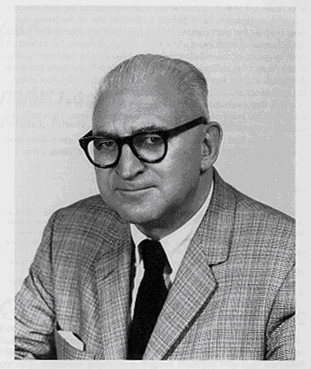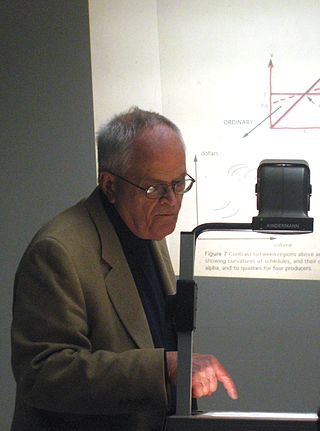Related Research Articles
Social science is one of the branches of science, devoted to the study of societies and the relationships among individuals within those societies. The term was formerly used to refer to the field of sociology, the original "science of society", established in the 18th century. In addition to sociology, it now encompasses a wide array of academic disciplines, including anthropology, archaeology, economics, human geography, linguistics, management science, communication science, psychology and political science.

Harold Dwight Lasswell was an American political scientist and communications theorist. He earned his bachelor's degree in philosophy and economics and his Ph.D. from the University of Chicago. He was a professor of law at Yale University. He served as president of the American Political Science Association, American Society of International Law, and World Academy of Art and Science.

An academic discipline or field of study is a branch of knowledge, taught and researched as part of higher education. A scholar's discipline is commonly defined by the university faculties and learned societies to which they belong and the academic journals in which they publish research.

Quantitative research is a research strategy that focuses on quantifying the collection and analysis of data. It is formed from a deductive approach where emphasis is placed on the testing of theory, shaped by empiricist and positivist philosophies.
The behavioural sciences explore the cognitive processes within organisms and the behavioural interactions between organisms in the natural world. It involves the systematic analysis and investigation of human and animal behaviour through naturalistic observation, controlled scientific experimentation and mathematical modeling. It attempts to accomplish legitimate, objective conclusions through rigorous formulations and observation. Examples of behavioural sciences include psychology, psychobiology, criminology, anthropology, sociology, economics, and cognitive science. Generally, behavioural science primarily seeks to generalise about human behaviour as it relates to society and its impact on society as a whole.
Quantitative psychology is a field of scientific study that focuses on the mathematical modeling, research design and methodology, and statistical analysis of psychological processes. It includes tests and other devices for measuring cognitive abilities. Quantitative psychologists develop and analyze a wide variety of research methods, including those of psychometrics, a field concerned with the theory and technique of psychological measurement.

Harrison Colyar White is the emeritus Giddings Professor of Sociology at Columbia University. White played an influential role in the “Harvard Revolution” in social networks and the New York School of relational sociology. He is credited with the development of a number of mathematical models of social structure including vacancy chains and blockmodels. He has been a leader of a revolution in sociology that is still in process, using models of social structure that are based on patterns of relations instead of the attributes and attitudes of individuals.

Mathematical sociology is an interdisciplinary field of research concerned with the use of mathematics within sociological research.

Tom A. B. Snijders is professor of Statistics in the Social Sciences at Nuffield College, Oxford, one of the constituent colleges of the University of Oxford. He is also professor of Methodology at the University of Groningen, a position he has held for more than twenty years.
Social network analysis (SNA) software is software which facilitates quantitative or qualitative analysis of social networks, by describing features of a network either through numerical or visual representation.

Sociology is the scientific and systematic study of human society that focuses on society, human social behavior, patterns of social relationships, social interaction, and aspects of culture associated with everyday life. Regarded as a part of both the social sciences and humanities, sociology uses various methods of empirical investigation and critical analysis to develop a body of knowledge about social order and social change. Sociological subject matter ranges from micro-level analyses of individual interaction and agency to macro-level analyses of social systems and social structure. Applied sociological research may be applied directly to social policy and welfare, whereas theoretical approaches may focus on the understanding of social processes and phenomenological method.

David Amiel Freedman was Professor of Statistics at the University of California, Berkeley. He was a distinguished mathematical statistician whose wide-ranging research included the analysis of martingale inequalities, Markov processes, de Finetti's theorem, consistency of Bayes estimators, sampling, the bootstrap, and procedures for testing and evaluating models. He published extensively on methods for causal inference and the behavior of standard statistical models under non-standard conditions – for example, how regression models behave when fitted to data from randomized experiments. Freedman also wrote widely on the application—and misapplication—of statistics in the social sciences, including epidemiology, public policy, and law.
David Reuben Jerome Heise was a social psychologist who originated the idea that affectual processes control interpersonal behavior. He contributed to both quantitative and qualitative methodology in sociology. He retired from undergraduate teaching in 2002, but continued research and graduate student consulting as Rudy Professor of Sociology Emeritus at Indiana University. He was most well known for his work on affect control theory.
Glenn Firebaugh is an American sociologist and leading international authority on social science research methods. Currently he is the Roy C. Buck Distinguished Professor of Sociology (Emeritus) at the Pennsylvania State University. He has also held regular or visiting faculty appointments at Harvard University, Vanderbilt University, Oxford University, and the University of Michigan. Firebaugh is best known for his contributions to statistical methods and for his research on global inequality. In 2018 he received the Paul F. Lazarsfeld Award from the American Sociological Association for "a career of distinguished contributions to the field of sociological methodology." His publications are highly cited by other social scientists.
Anuška Ferligoj is a Slovenian mathematician, born August 19, 1947, in Ljubljana, Slovenia, whose specialty is statistics and network analysis. Her specific interests include multivariate analysis, cluster analysis, social network analysis, methodological research of public opinion, analysis of scientific networks. She is Fellow of the European Academy of Sociology.

A social network is a social structure made up of a set of social actors, sets of dyadic ties, and other social interactions between actors. The social network perspective provides a set of methods for analyzing the structure of whole social entities as well as a variety of theories explaining the patterns observed in these structures. The study of these structures uses social network analysis to identify local and global patterns, locate influential entities, and examine network dynamics.
James Tarlton Townsend is a Distinguished Rudy Professor of Psychology at Indiana University, Bloomington. He is known for his work in mathematical psychology, particularly in distinguishing parallel and serial processing and for models of perception.
Joseph Galaskiewicz is an American sociologist and Professor of Sociology at the University of Arizona, known for his work on interorganizational relations and social network analysis.
Bernice A. Pescosolido is an American sociologist, currently a Distinguished Professor of Sociology and Director of the Irsay Institute and Indiana Consortium for Mental Health Services Research at Indiana University, and also a published author. From 1998 to 2006, she was also the Chancellor's Professor of Indiana University. She has also served as Vice-President of the American Sociological Association and its Chair of Sociology of Mental Health and Medical Sociology.
Peter Marsden is an American sociologist. He is the Edith and Benjamin Geisinger Professor of Sociology at Harvard University.
References
- ↑ Stanley Wasserman, CV. January 2007 at stat.indiana.edu. Accessed 02.02.2015
- ↑ View/Search Fellows of the ASA, accessed 2016-12-10.
- ↑ Galaskiewicz and Wasserman (1994/2006)